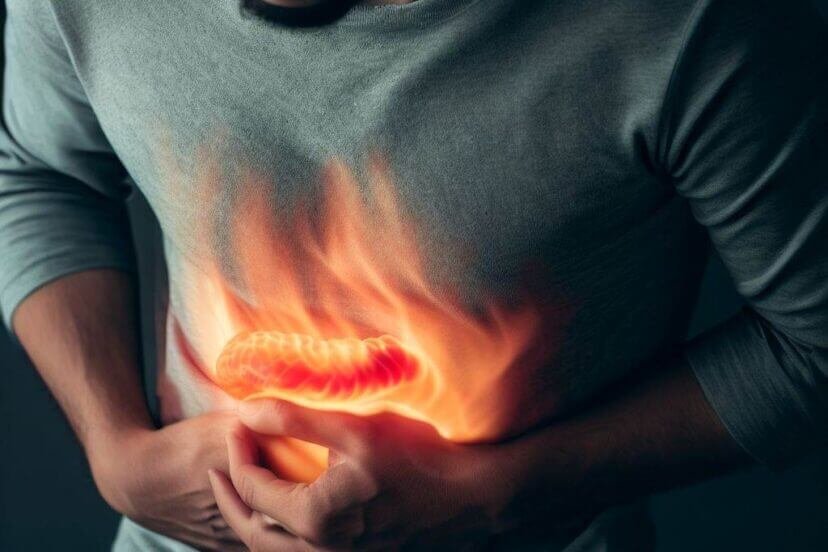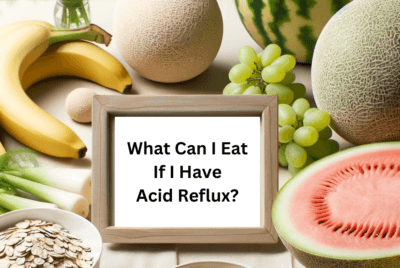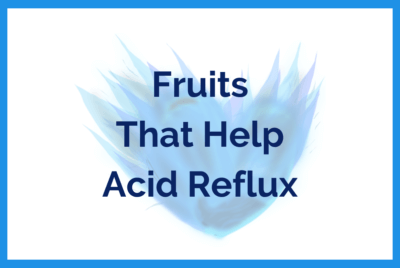Discover The Cause Of Heartburn And Acid Reflux and How To Get Relief
Table of Contents
Getting to the Bottom of Cause of Heartburn and Acid Reflux
Feel like you just swallowed a fiery ball of lava? If you’re experiencing a burning feeling rising up from your stomach after eating, you’re likely among the millions who know the torment of heartburn. Left untreated, heartburn can evolve into a more serious condition known as acid reflux or gastroesophageal reflux disease (GERD). In this comprehensive guide, we’ll dig into the causes, symptoms, risk factors, and both medical and lifestyle treatments for quelling the flames of heartburn and acid reflux. Arm yourself with the knowledge you need to extinguish this fire and prevent it from flaring up again.

The Burning Basics: What is Heartburn and Acid Reflux?
Let’s start by getting clear on what heartburn actually is. Quite simply, heartburn is a painful, burning sensation that occurs in the chest, just behind the breastbone. Contrary to what the name implies, heartburn has nothing to do with the heart. Rather, it’s caused by stomach acid backing up into the esophagus, the long tube that connects your mouth and stomach.
More specifically, a ring of muscle at the bottom of the esophagus known as the lower esophageal sphincter (LES) normally acts as a gatekeeper, relaxing to allow food into the stomach but closing tightly to prevent stomach contents from escaping back upwards. However, when the LES becomes weak or relaxes abnormally, stomach acid can reflux back into the esophagus. This flow of acid irritates the lining of the esophagus, causing it to become inflamed and triggering those dreaded heartburn symptoms.
Acid reflux refers to when stomach acid frequently flows backward into the esophagus, leading to frequent heartburn episodes. If you experience acid reflux more than twice per week, you may be diagnosed with gastroesophageal reflux disease (GERD). Left untreated over many years, GERD can cause serious complications like inflammation and scarring of the esophagus. That’s why it’s so important to get chronic heartburn under control.
The Usual Suspects: What Causes That Fiery Feeling?
A variety of factors can loosen the LES or force stomach acid where it doesn’t belong, triggering heartburn in unsuspecting victims. Let’s investigate the top culprits behind the burn:
- Your Habits: Smoking, wearing tight fitting clothing or belts, overeating, and – ironically – lying down too quickly after eating can all put pressure on the stomach, forcing the LES open temporarily.
- Your Diet: Greasy, fried foods tend to delay stomach emptying. Spicy foods, chocolate, caffeine, alcohol, citrus fruits, tomatoes and other acidic foods can directly irritate the esophagus. Overloading your stomach with large portions also increases risk of acid reflux.
- Your Weight: Excess belly fat and overall obesity both put extra pressure on the stomach, making the LES more likely to relax abnormally and give acid the opportunity to back up. Even small amounts of weight loss can bring relief.
- Medications: Certain prescription drugs including pain relievers, sedatives, antidepressants and blood pressure medications can negatively impact LES pressure and esophageal muscle contraction, increasing acid reflux symptoms.
- Health Conditions: GERD is more common in those with a hiatal hernia, where part of the stomach bulges into the chest through the diaphragm muscle. It’s also associated with diabetes, certain connective tissue disorders, and delayed stomach emptying.
- Pregnancy: Hormonal changes and growing pressure from the expanding womb can promote acid reflux and heartburn in expecting mothers, especially in the third trimester.
So in summary, a number of lifestyle factors, medications, medical conditions and even pregnancy can conspire to unleash the tidal wave of burning acid leading to heartburn and GERD. But knowledge is power. Now that you know the common causes, let’s explore how to douse the flames.
Lifestyle Changes: Your First Line of Defense
For mild to moderate heartburn that occurs only occasionally, simple lifestyle modifications are often the most effective remedy. Making the following changes can stop the cause of heartburn and acid reflux flareups in their tracks:
- Maintain a healthy weight – even losing 5-10% of excess body weight offers quick relief
- Wear loose, low-rise clothing to avoid abdominal pressure
- Quit smoking, as this weakens the LES muscle over time
- Limit alcohol, caffeine, carbonation, fatty foods and other common heartburn triggers
- Eat smaller, more frequent meals instead of large portions
- Wait at least 3 hours after eating before lying down or going to sleep
- Elevate the head of your bed 6-9 inches to use gravity against nighttime reflux
- Explore stress reduction techniques, like yoga, meditation or counseling
- Keep a food diary to identify your unique heartburn triggers, then avoid them
With some diligence about these lifestyle tweaks, many heartburn sufferers find great relief from their symptoms and avoid progression to more serious GERD complications.
Dietary guideline adherence for gastroesophageal reflux disease – A scientific study from the National Library of Medicine that explores the role of dietary habits in managing GERD.
Over-the-Counter Medications: Reducing Acid on the Front Lines
When lifestyle adjustments alone aren’t fully taming the flames, a variety of over-the-counter medicines offer an easy first line of treatment:
- Antacids like Tums, Rolaids, and Maalox work quickly to neutralize stomach acid and quell heartburn. However, their effects are short-lived.
- H2 blockers like Zantac, Pepcid and Axid lessen acid production, offering longer relief than antacids. Most can be taken daily with few side effects.
- Proton pump inhibitors (PPIs) like Prilosec, Prevacid and Nexium shut down acid production more powerfully. But they may cause vitamin deficiencies with long-term use.
Always follow dosage instructions carefully when taking OTC heartburn remedies. And see your doctor if symptoms persist despite proper use. More advanced treatment may be needed at that point.
Prescription Medications: Calling In Medical Reinforcements
For moderate to severe heartburn that isn’t responding sufficiently to lifestyle changes and OTC meds, stronger prescription treatments may be prescribed by your doctor:
- Stronger PPIs like prescription strength Prilosec and Nexium offer more potent acid blocking action than lower dose OTC versions of the same drugs.
- H2 blockers like prescription famotidine (Pepcid) can be prescribed at higher strengths for additional acid suppression.
- Prokinetics like Reglan and domperidone help strengthen the LES while also improving stomach emptying, decreasing reflux.
- Antibiotics may be used short term along with acid reducers to treat H. pylori infections contributing to ulcers and GERD.
Always take prescription reflux medications exactly as directed by your physician and report any worrisome side effects. Used properly, they offer stronger ammunition against stubborn heartburn symptoms.
Advanced Procedures: Busting Out the Big Guns
For those with severe, chronic GERD not responding to other treatments, several advanced surgical and endoscopic procedures aim to reinforce the faulty LES valve and reduce acid reflux from the source:
- Fundoplication surgery wraps the upper part of the stomach around the lower esophagus to tighten the LES and prevent reflux.
- Stretta procedure uses radiofrequency energy to thicken and strengthen the LES muscle fibers.
- LINX device places a ring of magnetic titanium beads around the base of the esophagus to keep the LES closed yet flexible.
- Endoscopic procedures like EsophyX and Medigus Ultrasonic Surgical Stapler reconstruct or augment the deteriorated LES.
Though invasive, these procedures show good long-term results for acid reflux reduction in many patients. Be sure to discuss risks and benefits thoroughly with your doctor.
Alternative Approaches: Experimenting with Natural Relief
For mild to moderate heartburn, some alternative remedies may coat and soothe the irritated esophagus:
- Herbal teas with chamomile, licorice, marshmallow root or slippery elm have traditionally been used to ease GERD symptoms.
- Baking soda acts as a natural antacid to neutralize stomach acidity. Mix 1/2 tsp in water as needed.
- Aloe vera juice may form a protective barrier on the esophagus lining to prevent reflux burning.
- Acupuncture may relieve GERD by reducing stress levels. More studies are needed.
- Hypnosis has shown promise for lessening heartburn, acid reflux and improving LES function in some small studies.
Always check with your doctor before trying herbal supplements, which may interact with medications. While natural remedies appear promising for relief from the cause of heartburn and acid reflux, more research is still needed.
Knowing When It’s Time to See Your Doctor
While home remedies can often tame occasional heartburn flareups, consult a doctor if any of the following apply:
- You experience persistent heartburn more than 2 times per week
- Symptoms are severe enough to disrupt sleep, work or normal activities
- OTC medications don’t provide sufficient relief
- You have difficulty swallowing, lose weight unintentionally, or vomit blood
- Heartburn is accompanied by worrisome symptoms like chest pain, sweating, lightheadedness
Left unchecked, the cause of heartburn and acid reflux can evolve into a more harmful condition. Getting an accurate diagnosis and timely treatment from your doctor ensures you gain control over your symptoms and prevent further complications.
Looking Forward: Emerging Heartburn Research & Treatment
While current medical and lifestyle therapies provide good relief for many, researchers are constantly seeking to improve heartburn management. Areas of interest include:
- Exploring whether altering gut microbiome imbalances could reduce acid reflux
- Developing new medications that strengthen the LES and accelerate stomach emptying
- Enhancing minimally invasive surgeries to reconstruct or augment the deteriorated LES
- Designing improved techniques to measure and monitor esophageal acid exposure
- Understanding genetic and immune factors related to developing Barrett’s esophagus
Though heartburn can certainly feel like you’re enduring the fiery pits of hell, take comfort that cutting-edge research is underway to provide even more effective treatments. For now, a combination approach offers your best chance for extinguishing the flames.
In Summary: Cooling the Heartburn Burn
In closing, heartburn and its more severe form, acid reflux, develop when stomach acid washes backward into the esophagus due to a weakened or abnormally relaxed LES valve. A variety of lifestyle habits, foods, medications and medical conditions can contribute to this dreaded burning chest discomfort. While antacids and acid reducers can temporarily douse the flames, over the long-term, lifestyle adjustments provide the best prevention. Persistent heartburn should be evaluated by your doctor, as chronic acid reflux can lead to serious esophageal damage if left uncontrolled. But with the right multifaceted treatment plan, you can stamp out this inner fire and say goodbye to the burn for good.
Heartburn Q&A: Your Top Questions Answered
Q: What’s the difference between heartburn, acid reflux and GERD?
A: Heartburn refers to the actual burning discomfort, while acid reflux means stomach acid flows back into the esophagus, often causing heartburn. GERD stands for gastroesophageal reflux disease, which is when you experience acid reflux more than twice weekly.
Q: Why do certain foods seem to trigger my heartburn?
A: Spicy, fatty and acidic foods tend to overload the stomach or directly irritate the esophageal lining. This increases the chance of acid reflux. Try keeping a food diary to identify your personal triggers.
Q: Can stress and anxiety make heartburn worse?
A: Stress itself won’t directly be the cause heartburn and acid reflux, but it can lead to strain-related habits like overeating, smoking, or drinking alcohol that contribute to acid reflux.
Q: Are there any serious complications from untreated heartburn?
A: Left unchecked over many years, chronic acid reflux can inflame, scar and narrow the esophagus. In rare cases it can lead to cancer. That’s why it’s important to treat GERD early and consistently.
Q: What OTC or prescription medications are used for heartburn?
A: Antacids, H2 blockers and proton pump inhibitors (PPIs) treat heartburn by neutralizing or reducing stomach acid. Stronger versions are available by prescription if needed.
Q: When should I consider surgery for severe heartburn?
A: When lifestyle changes and medications aren’t providing adequate symptom relief. Procedures like fundoplication and LINX system can strengthen the faulty LES valve to prevent reflux.
Q: Do any natural remedies help ease heartburn symptoms?
A: Herbal teas, licorice, aloe vera, baking soda, and acupuncture may soothe symptoms for some people, but more research is still needed.
Q: How can I prevent heartburn flare ups?
A: Losing weight, avoiding trigger foods, not smoking, limiting alcohol, waiting 3 hours after meals to lie down, and eating smaller meals can all help prevent acid reflux.
Q: When should I see a doctor about my heartburn?
A: If it’s frequent or severe, disrupting your sleep or daily life, not responding well to treatment, or accompanied by trouble swallowing, unintended weight loss or other concerning symptoms.




